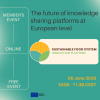Chairs:
- Francesco MARRA (University of Salerno, Italy) - fmarra@unisa.it
- Ferruh ERDOGDU (Ankara University, Turkey)
- Fabrizio SARGHINI (University of Naples "Fecerico II", Italy)
Virtualization is a term very popular in IT and computer science especially when referred to "virtual computer" as a logical representation of a computer in software. By decoupling the physical hardware from the operating system, virtualization provides more operational flexibility and increases the utilization rate of the underlying physical hardware (IBM, 2007). So, basically, thanks to virtualization it is possible to have a machine (the virtual one) that is totally independent by the hardware. In a similar way, under "virtualization in food engineering" we should include a list of activities (that could be purely intellectual and/or mathematical and/or computational) such as "data modeling", "statistical analysis", "fundamental modeling", "dynamic simulation", "optimization" when they are able to provide the researcher with a virtual machine/plant/process/product that has all the characteristics of the "real case" it was inspired to, without needing any physical hardware (here hardware has a different meaning of course), so that it provides more process flexibility ("I can explore more phenomena, deeply, in the same time") and it increases the utilization rate of the underlying physical hardware (since with virtualization the final goal will be optimization and thus the increase of utilization of a given plant or process). Thus modelling, simulation, optimization and dynamic studies are a part of a wider scheme that is described as virtualization. While a number of manufacturing sectors (e.g., aerospace, defense, automotive) are benefiting for decades from modeling activities and virtualization of processes, the food industry (that represents more than 5% of the global GDP and the first in Europe) is still lagging to utilize the wide spectrum potential offered by virtualization as an engineering design tool (Marra, 2014). Some years ago (2004), Singh and Erdogdu published a book on "Virtual Experiments in Food Processing", claiming that virtualization allows to conduct experiments using a computer or a mobile device. Undoubtedly, the use of virtual tools reduces the overall time needed for developing, designing and validating processes and equipment, circumvents the tailored made production of un-efficient numerous prototypes, reduces development costs and consequently reduces the time to market. Thus, virtualization addresses and fulfills the needs of new and sophisticated strategic tools for innovation in the food industry reducing the time needed for developing, designing and validating processes and equipment. (Marra, 2015, The White Page of Virtualization in Food Engineering).
The proposed SIG is aimed to:
- implement education and research that can exploit the use of virtualization in food engineering offering new opportunities for the food and agricultural industry;
- provide training activities on the several aspects of the virtualization (modeling, simulation, optimization, computer aided design and other similar activities) applied to food and biological systems;
- exchange ideas and methodologies;
- grow a reference group about virtualization in food engineering in view of preparation of projects and network proposals.
Deliverables and activities:
- A dedicated web-site, to be used as a platform for discussions and sharing of information (www.virprofood.org)
- Organization of seminars, webinars and summer schools: particularly, the proposed SIG is working about the organization of the first summer school in Modeling and Simulation in Food and Bio Processing (MSFS2016), to be held in Capri (Italy) in June 2016;
The SIG is open to all interested people that would like to actively contribute and collaborate. Please register as non-member here and check SIG “Virtualisation”, or as member, if you want to support the activities with a yearly fee.
For more information and/or expression of interest please send email to the chairs
Links
Recent Activities by SIG chair
- International Symposium on Virtualization of Processes in Food Engineering (Fisciano, SA, Italy, 1-3 October 2014)
- Membership in the scientific committee of SimFood2015 (Parma, Italy, 22 April 2015)
- Management of a special session at International Conference of Food Engineering 12, Quebec City, Quebec, Canada, 14-18 June 2015)
- Membership in the scientific committee of European Comsol Conference 2015, Grenoble, France, October 2015)




